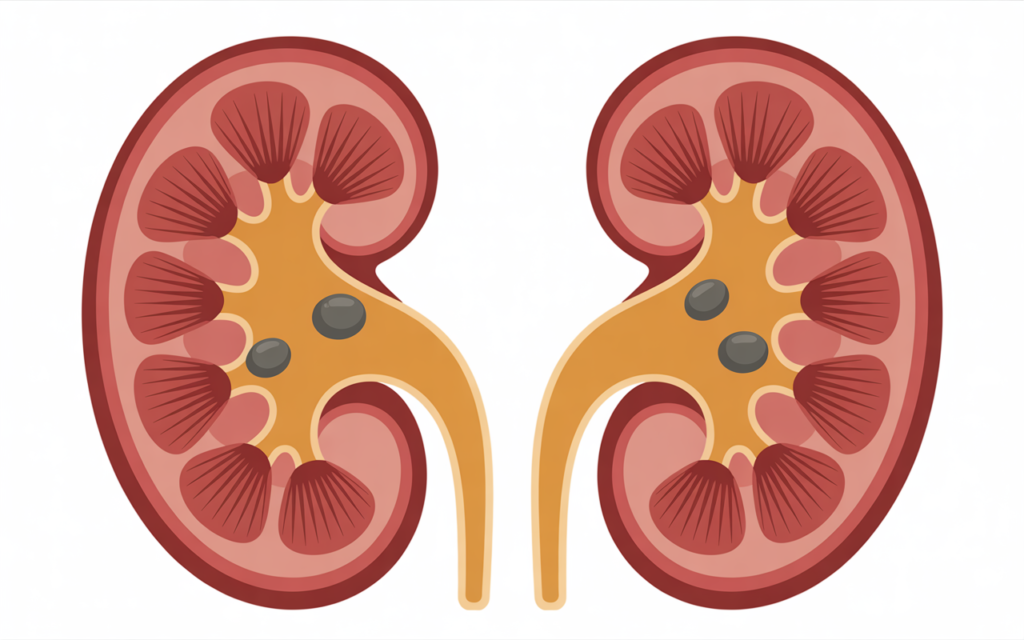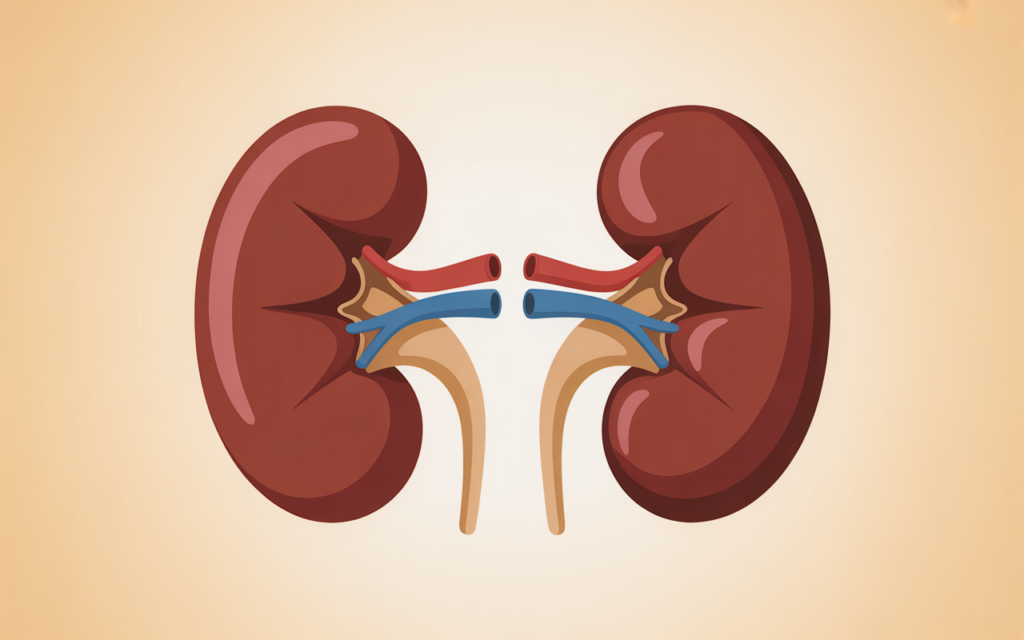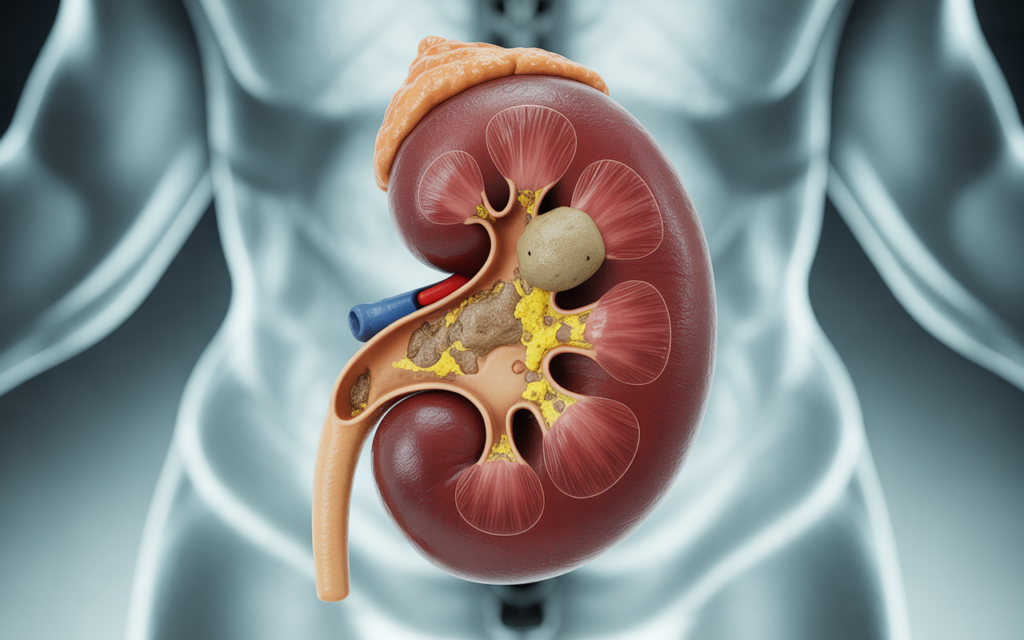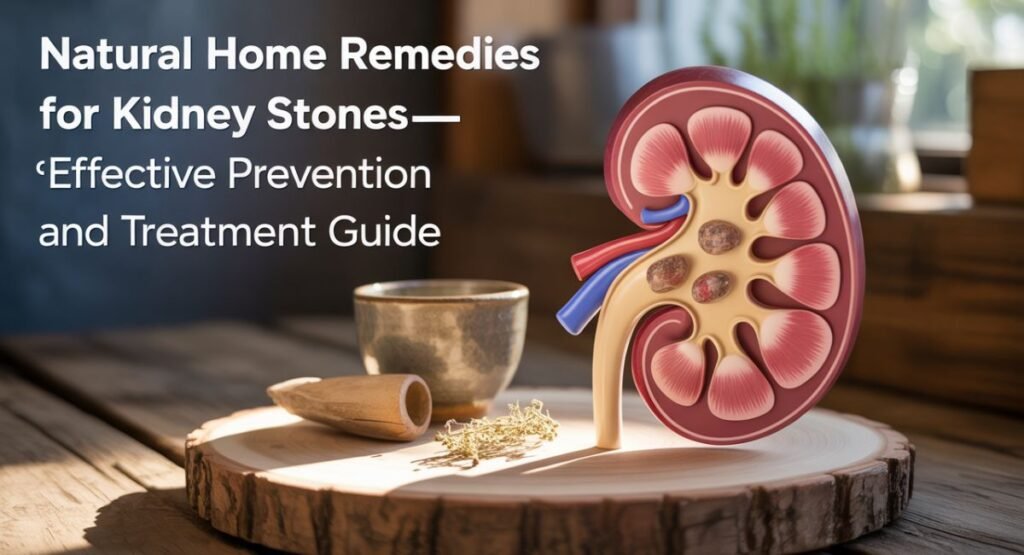Introduction
Kidney stones can feel like a storm inside your body—sharp pain, discomfort, and endless worry. While modern medicine offers effective solutions, many people in the USA are turning toward natural home remedies for kidney stones for safer, gentler support.
These remedies not only ease symptoms but also work wonders for prevention. From drinking lemon water to boosting hydration, such practices can play a vital role in protecting kidney health. However, it’s essential to understand their limits and when professional help is necessary. By combining lifestyle strategies with medical advice, you can manage and prevent stones effectively.

What Are Kidney Stones and Why They Form
Kidney stones are solid mineral and salt deposits that develop inside the kidneys. These stones form when urine becomes concentrated, causing minerals like calcium, oxalate, and uric acid to crystallize.
Several factors contribute to stone formation:
- Dehydration and inadequate water intake.
- High intake of salt and red meat in kidney stone formation.
- Low citrate levels in urine, which normally prevent crystals.
- Genetic predisposition and certain medical conditions.
Without prevention, stones often return. Research shows a recurrence of kidney stones in nearly 50% of patients within five years.
Common Symptoms of Kidney Stones
The most noticeable symptom is sharp, severe pain. It often radiates from the side of the back to the lower abdomen.
Other symptoms include:
- Blood in urine.
- Burning sensation during urination.
- Cloudy or foul-smelling urine.
- Nausea and vomiting.
- Increased urgency to urinate.
In severe cases, untreated stones can cause urinary tract blockage, infection, or even long-term kidney injury risk.
Diagnosis and Medical Evaluation
Doctors use imaging tools such as CT scans, ultrasounds, and X-rays to locate stones. Blood and urine tests provide insights into mineral levels and underlying causes.
Tests may reveal:
- High calcium or oxalate.
- Low citrate levels in urine.
- Signs of infection or inflammation.
Medical professionals often combine diagnostics with nephrologist advice on kidney stones to recommend treatment or preventive strategies.

Home Remedies for Kidney Stones
Natural remedies are valuable for small stones and prevention. They help support kidney function, reduce pain, and lower the chance of recurrence.
Hydration First
Adequate water intake is the simplest and most effective solution. Drinking water and kidney stone prevention go hand in hand. It dilutes urine, lowers crystal concentration, and helps flush stones naturally.
Lemon Juice and Citrate Support
Lemon juice for kidney stones increases urinary citrate levels, which prevent calcium from binding with oxalate. A glass of warm water with lemon twice daily can reduce recurrence rates significantly.
Apple Cider Vinegar
Apple cider vinegar, rich in acetic acid, supports the breakdown of small stones. It also promotes better digestion and urinary health. Mix two tablespoons with water once daily for best results.
Wheatgrass and Herbal Remedies
Wheatgrass juice and dandelion root tea are known natural diuretics. They help detoxify the urinary tract and reduce stone risks. These options are useful for natural prevention of kidney stones.
Diet and Foods to Avoid
Dietary choices strongly influence nutrition and kidney health. People prone to stones should limit:
- Foods to avoid with kidney stones (spinach, chocolate, nuts) due to high oxalate content.
- Excess sodium, which raises calcium excretion.
- Processed meats and sugary drinks, which contribute to imbalance.
At the same time, balancing calcium intake is crucial. Too much or too little calcium can increase stone risk. A balanced diet protects long-term kidney health.
Medical Treatment for Kidney Stones
When stones cannot pass naturally, medical intervention is required.
- Shock wave therapy for kidney stones uses sound waves to break stones into smaller pieces.
- Ureteroscopy for kidney stones involves inserting a scope to remove or fragment stones.
- Medications help with uric acid stone dissolution and calcium oxalate stone treatment.
These minimally invasive kidney stone treatments are effective and safe, reducing hospital stays and recovery time.

Complications of Untreated Stones
Ignoring stones leads to serious problems. Risks include:
- Severe infections and high infection risk from kidney stones.
- Long-term obstruction and kidney injury risk.
- Bloodstream infections in extreme cases.
The risk of delaying treatment is too high. Patients should always seek professional urology guidance when symptoms persist.
Prevention vs. Cure—What Works Best
Prevention vs. cure of kidney stones is a critical debate. Prevention is always less painful, less costly, and more effective.
Preventive measures include:
- Drinking enough fluids daily.
- Eating fresh fruits, vegetables, and whole grains.
- Following lifestyle changes for kidney stone prevention, such as exercise and weight management.
- Seeking medical advice for kidney stones regularly for monitoring.
Case Studies in the United States
Hydration in Texas
A 36-year-old construction worker developed recurring stones due to dehydration. After increasing his daily intake to three liters of water, he reported no further episodes in two years.
Diet Change in New York
A woman with repeated calcium stones reduced her intake of processed meats and salt. Combined with lemon juice for kidney stones, she achieved long-term prevention.
Medical Treatment in California
A patient with a large obstructive stone underwent shock wave therapy for kidney stones. After treatment, he followed a preventive diet and hydration plan. No recurrence has been reported since.
Kidney Stones in the United States – Statistics
| Data Point | Statistic | Source |
|---|---|---|
| Lifetime risk | 1 in 10 people | National Kidney Foundation |
| Annual ER visits | Over 500,000 | NIH |
| Recurrence rate | 35–50% within 5 years | American Urological Association |
| Most common type | Calcium oxalate | Mayo Clinic |
| Gender difference | Men 11%, Women 9% | CDC |
These figures emphasize the importance of kidney stone prevention tips for long-term health.
Conclusion
Home remedies for kidney stones provide valuable support, but they should never replace medical treatment for kidney stones when needed. The best approach combines hydration, a balanced diet, and professional guidance.
By embracing both natural prevention of kidney stones and timely medical care, we can minimize kidney stone complications and risks. Prevention remains the strongest shield against recurrence and pain.
Questions to ask your healthcare professional
- Can I get a 24-hour urine test to find out why I’m getting kidney stones?
- What type of kidney stone did I have, and how does that affect my treatment?
- Should I be eating more or less calcium to prevent kidney stones?
- Do I need to avoid foods with oxalate, like spinach or almonds?
- Can I see a dietitian to help me plan meals that prevent kidney stones?



